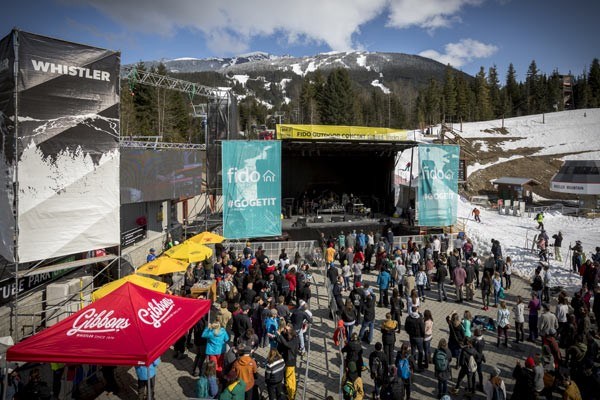Walking the village and enjoying all the animation and vibe, it is hard to imagine Whistler without a World Ski and Snowboard Festival (WSSF).
But with the announcement last week that Watermark Communications Inc. and its executive director Sue Eckersley will no longer produce the festival, it is likely change is coming.
Whistler Blackcomb (WB), really Vail Resorts, the majority shareholder of the festival along with its minority partner Tourism Whistler, were both careful in statements last week to say the festival will continue — but let's not mince words: Without Sue at the helm, it just won't be the same.
WB has always been about making sure that whatever it is involved in is all about WB.
While the WSSF has been about celebrating the culture of snow sports — that's more than just the signature ski and snowboard events on the mountain — it's the stories of the community and the people who made Whistler what it is today.
Lots of resorts have spring ski parties, but none of them hold a candle to Whistler's, and residents, businesses and visitors alike hope that's the legacy that continues.
Muddying the waters of the scrying cup is the announcement earlier this year of a new sport festival to start up in April 2018. Details are scant, but at the time of the February announcement by the Resort Municipality of Whistler (RMOW), it was already a bit of a head-scratcher as April hosts both the WSSF and the Whistler Cup then — and there is Easter as well. The Festivals, Events and Animation Committee proposed $20,000 for the business planning and concept development of the new multi-sport festival geared towards youth.
But how many festivals and events can April support?
The new event's working name is the Whistler Youth Games, and the plan is to incorporate competitive sliding, Nordic, snowboard and freestyle skiing events into a new festival similar in nature to the successful Whistler Cup.
Lucinda Jagger, vice president of sport with Whistler Sport Legacies (WSL), told Pique in February: "We would hope that it could be built on the Whistler Cup and actually add value to the Whistler Cup, but also add value to the (World) Ski and Snowboard Festival."
The event is being jointly developed with input from WSL, Whistler Blackcomb, the RMOW and Tourism Whistler. (Yes, two of the parties at the table on the new festival are also the owners of the WSSF.)
The WSSF has drawn thousands to town with many businesses relying on the event to round out winter profits year after year.
This despite the loss of a title sponsor several years ago and the annual two-step Eckersley has had to do to find sponsors and a budget to run the ever-popular festival.
This year, the festival received $100,000 in Resort Municipality Initiative (RMI) funds, down from a high of $135,000 in 2013 when it also had a budget of $1.8 million. (The RMI is an annual $10.5-million program in which hotel funds are collected in 14 B.C. resorts and then doled back into the communities for tourism-related projects based on a formula.)
The RMI funds — funds to be used for exactly this type of event, bringing visitors to the resort and highlighting the amazing offerings of our festivals and events — have helped the resort realize some real gains in the tourist market. None of us can take tourism for granted — or the WSSF either. This festival has grown to iconic proportions under the careful, prudent and creative stewardship of Eckersley and her team.
Let's not lose sight of the fact that according to an economic impact study of the festival, in 2012 the total economic activity (industry output) generated by the WSSF was $27.3 million in the province, with $14.7 million occurring in Whistler — and those numbers are likely out of date.
The report found that of the more than 70,000 guests attending the 2012 festival, 20,000 were local, more than 33,000 were domestic and more than 17,000 were international.
Combining the attendance estimates with the average spending per person and the Canadian Sport Tourism Alliance assessment, it was concluded that visitors to the festival spend $22.5 million in Whistler.
The largest percentage of that spend, at $7.2 million, goes to food and drink, followed by $4.5 million on accommodation, and $3.84 million on recreation and entertainment.
Impressive numbers for a festival that is driven by passion, rather than absolute dollars.
At no time during the year does Whistler feel more like its true self than during the World Ski and Snowboard Festival. It's a time to rekindle our love of the mountains, this corridor, and kick back and relax in our hometown.
So raise a glass to Sue in thanks and here's to hoping the festival continues its great trajectory.




